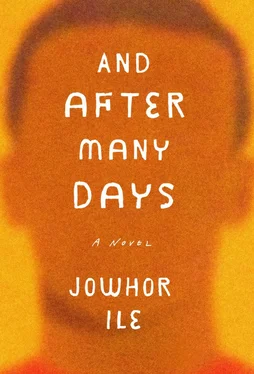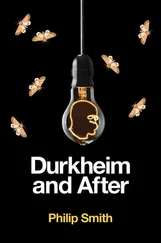Paul is in the bathroom. They hear the toilet flush. Twice.
“ Paul, are you feeling sick? I thought I saw you go to the bathroom already this morning. I have red-and-yellow capsules to give you, if that is the case. ”
No response.
“ Paul! Are you still in the bathroom? Are you giving birth or what? What is the meaning of this nonsense this morning? So you won’t be happy until you make me late for school? I am conducting assembly this morning, and I have a staff meeting.”
The toilet door opens. Paul comes out, face long like rope, makes his way into the parlor, passes them at the dining table, where his food sits abandoned, and enters the kitchen. Ma’s impatient heels click-clack after Paul into the kitchen, but when she speaks, her voice is quiet and gentle. “What is the matter?”
“ I told you the other day, that I’m tired of being a day goat.”
“Day goat? What kind of talk is that? What’s wrong with being a day student? Is it because your friend Fola is attending a boarding school? Let’s talk about this after school. Please carry your bag and get in the car. ”
She packs Paul’s breakfast and pours his tea into a thermos so he can eat on their way to school.
—
During the holidays, Ajie and Bibi learned that Paul would be attending a boarding school from the next term; he would begin class two.
In the weeks that followed, Ajie and Bibi choked in their collective longing. Paul’s grades were excellent, so he would get a coveted place at a federal government college, where students were rarely admitted in second form. Their parents lit up like torches and burned with pride. There was nothing else they talked about that holiday. They took Paul for the four-hour drive to the school, even though it was closed and there was really nothing much they could see. Why hadn’t they thought of this all along? They chided themselves. They should have registered Paul for the common entrance examinations, so he could get a place from form one. Surely Paul would have made it on the merit list to any federal school of his choice in the country. Then Ma cautioned that being very far away was not too good; this one was far enough. Bendic said boarding school helped children develop independence; it got them ready for the world. Ma said the academic standards of the federal schools were much higher than those of the expensive private schools.
Bibi had already found a book with the list of all federal colleges in the country and begun to deliberate about which schools to apply to. The farther away they were, the more desirable they became. “F.G.C. Sokoto is definitely where I’ll be going,” she said. “I don’t like the idea of an all-girls school, or F.G.G.C. Potiskum would have been more like it.” She asked Ma if she could use the phone, then spent over an hour talking to her friend Dawari, asking if she would also choose F.G.C. Azare so they could go together.
“Why up north?” Ma asked. “What happened to the one here in Port Harcourt, or Calabar?”
Bibi was having none of it; she pushed farther, to the desert borders of Chad and Niger Republic. “Do you think Bauchi will be cool?”
But the time for applying to schools hadn’t come, so she just sailed about the house with a special brand of envy that translated into utter selflessness when it came to anything having to do with Paul’s new school. “Ma, look at that bucket. Please buy it for Paul so if his dorm showers aren’t working, he can have a bucket bath instead. Ma, please buy those rubber sandals for Paul, the rainy season is coming, and you don’t want him to destroy his leather ones in the rain. Ma, rain cape. Ma, you haven’t marked Paul’s things with his name. They will steal everything from him! You have no idea what goes on in dormitories.”
Bibi became an expert in boarding school matters. Dawari’s brother attended a school up north and supplied them with the most harrowing stories of his experience. The bullying by senior students, mattresses that disappeared from bunks after night prep, leaving the unfortunate victims no choice but to sleep on the bare springs. In an attempt to teach one junior boy a lesson he would never forget, a senior boy connected a wire from the live socket on the dorm wall and delivered shocks to the junior boys’ genitals. Rather than discouraging Bibi and her friend, these stories terrified and excited them and made them want to go all the more. This was what they wanted: to be persecuted, to suffer some of these horrible things just so they could have the pleasure of telling the stories. Bibi helped Ma with stitching Paul’s initials on the inside collar of his shirts. She told Ma that red oil paint was clearly the best to mark Paul’s buckets and jerricans with, so he would be able to spot them from a mile away. Theft of buckets and jerricans was the order of the day at boarding schools. Bibi knew it all.
Paul was going to a new life. A life of padlocks and keys, cutlasses, sportswear, day wear, and six-spring mattresses. Ajie wished he were going in Paul’s place. Ajie knew Bendic kept the school’s prospectus in the top drawer of his desk, so when no one was about, he sneaked into the study and brought out the sheaf of beige A4 leaves held together by a spiral binding. He ran his fingers over the bold Baskerville font in which the school name was printed, then the coat of arms; he read aloud to himself the motto, which was in Latin , Pro Unitate, below that were address, phone numbers, reference number. Then the letter began: “Dear Parents/Guardians.”
There were several lists: required books, provisions allowed in school, a list of contraband marked with asterisks, and then a footnote warning that the contraband list wasn’t exhaustive. There were pages with drawings of the design of the school uniforms and day wear, and sample clips of the recommended fabrics.
As compensation, or maybe just his way of laying claim to Paul’s future boarding school experience, Ajie set off with reading all the recommended books they had bought for Paul. The integrated science text had glossy picture pages that smelled fresh, like new money. He thumbed through diagrams of the human respiratory system, as well as the skeletal, digestive, and reproductive systems. There were fourteen textbooks in all, excluding the two novels that were required reading for English, and the Revised Standard Version of the Bible, which had a stiff cover.
One afternoon Bibi saw Ajie curled up on the couch reading Paul’s copy of the novel The Unknown Tomorrow .
“You are not supposed to read that!” Bibi said, wounded.
Feeling guilty and surprised at being caught, Ajie quickly lowered the book and frowned.
“You are not old enough to read that book. Wait until I tell Paul. And by the way, who permitted you to touch it in the first place? Do you want to tear it?”
“I don’t tear books,” Ajie shot back defiantly.
“Shut up!” she yelled, and stormed out of the room.
—
Before Paul started attending boarding school, the children seldom stayed in their rooms during the day. They would return from school, slip out of their uniforms into house clothes, and then have lunch. Lunch was always eba and soup. It didn’t occur to Ajie then that people could have anything else for lunch on a weekday. Ma served the eba for all three children in one plate. She would part the heap in the center to let off steam, which made it look like a volcanic eruption. She served the soup in three little bowls from which the children chose by order of seniority. There were times when Bibi wasn’t sure which bowl to choose after Paul had taken his. She was certain there was a substantial difference in the quantity of soup or the size of meat in the two bowls, and she wasn’t ready to pass up the benefits of her seniority to Ajie in any way, so she looked carefully. She would tilt the bowl to one side to allow a better look at the chunk of meat, which was otherwise partly submerged in the leafy soup. Ajie would watch her in a slow burn, wanting to run into her like a road accident.
Читать дальше












